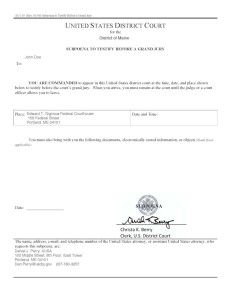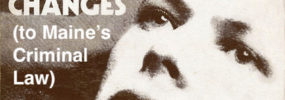Citizens can generally refuse to talk to police or prosecutors, but the United State’s Attorney has figured a way around that. Federal prosecutors can serve people with a grand jury witness subpoena, a court order forcing them to appear in court to truthfully answer questions. This process is a way for prosecutors to build a case against their main targets, but it’s also one of the ways that people loosely connected to criminal activity end up charged with Federal crimes. The grand jury process is secret, confusing, and dangerous. A criminal defense attorney who understands that process can help limit the witnesses’ risk, and might even be able to secure the witness immunity.
What is a Federal Grand Jury?
The federal grand jury is a group of 16-23 citizens who sit to consider evidence of criminal wrongdoing. A felony case can only proceed to trial if the grand jury returns an indictment, and they can only do that if at least 12 grand jurors find probable cause that the defendant committed the crime. The grand jury was devised as a check on government power, preventing the prosecution from charging cases based on lousy evidence. In practice, it does nothing of the sort. Since only the prosecution presents evidence, and since the defense has no right to challenge it, prosecutors can indict even the weakest cases with ease. The real function of the federal grand jury is to force people who might otherwise not talk to law enforcement to give testimony, under oath, about criminal activity. For more information about the grand jury, here is rule 6 of the Federal Rules of Criminal Procedure.
Facts About the Federal Grand Jury Process:
Once you understand some basic truths about the grand jury process, you begin to see how powerful it is for prosecutors, and how dangerous it can be for witnesses.
Basic Facts: Federal Grand Jury Subpoena
- People served with a subpoena must comply or face arrest.
- Grand Jury proceedings are secret and closed to the public.
- Witnesses may not be told who the targets are or exactly what crimes are being investigated.
- Witnesses are under oath and must testify truthfully.
- Witnesses can and will be prosecuted for perjury if they lie.
- Witnesses are questioned by the federal prosecutor but not by a defense attorney.
- Witnesses cannot bring their own lawyer into the room with them.
In the federal system, grand juries might meet several times over several months. When a subpoenaed witness arrives at court, they will likely meet with prosecutors and federal agents to be questioned. If the person has useful information, they will then be required to testify. While many people appear as witnesses, testify and then wash their hands of the case, a significant proportion of grand jury witnesses will end up charged as accomplices to main defendants. Those who try to lie to the agents or in their testimony, will be charged with federal crimes.
Self Incrimination and “Taking the Fifth”
The good news is that the fifth amendment prohibits the government from forcing people to incriminate themselves. Any witness can “take the fifth” and refuse to answer questions if the answer would be evidence of the witnesses’ own crimes. This means that the witness might have some degree of leverage over the prosecutors since the government can’t get the information unless they get around those fifth amendment protections.
Avoiding the Fifth: Immunity
If a witness plays their cards right, they can make the prosecution grant them immunity in exchange for testimony. Immunity is a binding, agreement that the prosecution will not use any of the witnesses’ testimony as evidence against them. Once granted immunity, the person’s fifth amendment rights are extinguished; since what they say will no longer incriminate them, they must answer all questions honestly.
A witness subpoenaed to the Federal Grand Jury can eventually be made to testify. The good news is that with immunity, the danger is significantly reduced. Also, since grand jury proceedings are secret, the target of an investigation will rarely be able to confirm who appeared at grand jury, much less what a witness said. Nobody wants to testify against their friends, or admit that they did things they’re not proud of, but the grand jury witness subpoena makes it very hard to avoid these issues.
While a Criminal Defense Attorney will not be with you in the grand jury room, they will be right outside the door. In the days before you ever agree to testify, they will make sure that your rights are protected and your risks are limited. These subpoenas are serious business and, in the wrong hands, a witness can very easily become a defendant.






